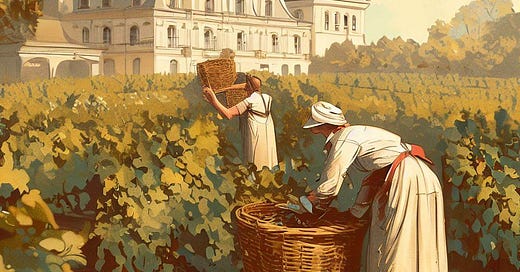The conservative case for wine—that wine should be naturally embraced by those of a conservative political bent—can’t and shouldn’t be boiled down to the old tropes of old, rich snobbish white guys sipping on their claret or wealthy industrialists snapping up trophy vineyards. The case is built on principles and values that have defined conservativism for centuries.
Thus, to make the point that wine ought to be the conservatives’ alcoholic beverage of choice, we begin at the foundation of conservativism and conservative thought: The Western conservative’s respect for faith and the endorsement of wine are both tied to the Christian bible.
It cannot be dismissed that Jesus’ first miracle is turning water into wine at the wedding in Cana (John 2:1-11), symbolizing joy and celebration. And even earlier, in the Hebrew Bible, wine is represented as a gift from God (Psalm 104:15) and meant to represent His generosity and blessings. And it hardly stops here. Throughout the Bible, wine is represented metaphorically and symbolically in poetic and prophetic passages. The conservative who embraces or merely respects the Christian faith and its call to serve is also called to use wine (moderately) to celebrate life and faith.
The respect for tradition that has long defined the conservative political mind can’t be divorced from the history of wine and its meaning for generations of imbibers and producers. From Burke to Kirk, the conservative embrace of tradition recognizes that traditions become traditions because they benefit society; that today’s standards are unlikely to be improved upon.
The cellaring of wine, the use of the cork to close bottles, the use of long-stemmed wine glasses, tasting the wine prior to the server serving, laying the wine on its side during storage—these and most other wine traditions, like social hierarchies or the husband as the protector of the family—have been proven useful to the wine industry and wine drinkers.
Merit is at the heart of wine. While some would argue that what is called “merit” in wine is actually an unjustified hierarchy imposed by historical inertia, they would be wrong. The ranking of estates, the gold and silver medals, and the ratings are all reflections of the two pillars of meritocracy: effort and discernment.
Today the conservatives are the element holding the line on meritocracy as the Left works to dismantle any nod or embrace of stature and talent. It is conservatism that insists effort and excellence must take precedence over an egalitarian commitment to the concept of trophies for all. Wine lovers know, or ought to know, that those bottlings that continually rise to the top of the roster, vintage after vintage, are stuffed with effort and through this effort deserve their place at the top of the list.
The fight against regulatory overreach and the personal liberty that is violated with its proliferation has been almost entirely the mission of conservatives. It remains today a primary plank of the conservative agenda to protect personal and commercial liberty by opposing excessive regulation.
No industry has more consistently opposed excessive regulation than the wine industry. Recognizing that long-held and long-protected restrictions on wine distribution, wineries were the group largely responsible for pushing back on wine shipping restrictions. Taking their case all the way to the Supreme Court, free market-minded producers coaxed the Court into reminding regulation-happy states that the Constitution is not an excuse for abusive, protectionist regulation. And it is worth noting that it was not members of the beer and distilling industries that pushed back.
The embrace of faith, a respect for the power of traditions, the emphasis placed on meritocracy, and a disdain for burdensome regulation are all at the heart of both wine and conservatism. The case for conservatism is the case for wine.
______________________
Click to see the Progressive Case for Wine.




